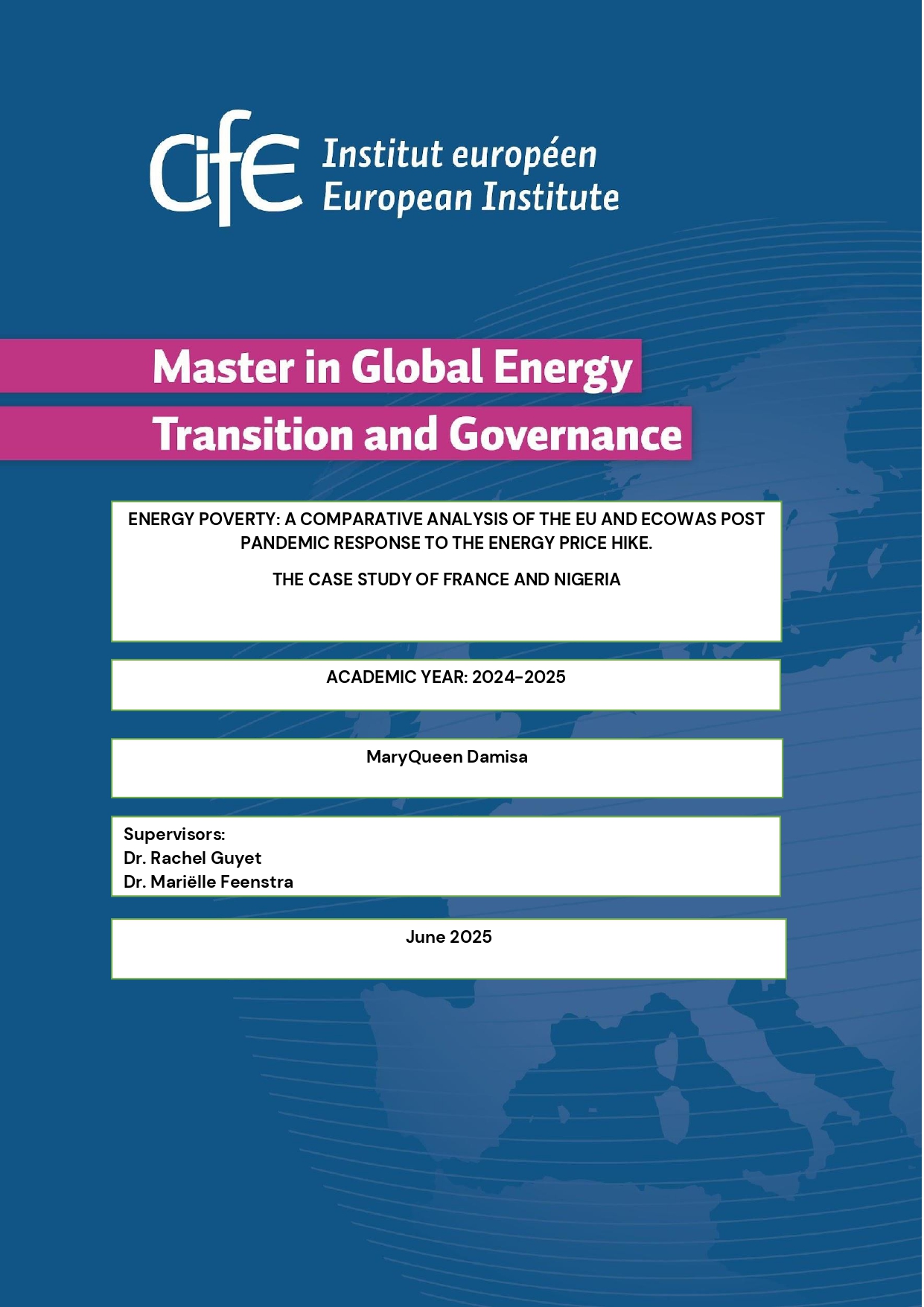ENERGY POVERTY: A COMPARATIVE ANALYSIS OF THE EU AND ECOWAS POST PANDEMIC RESPONSE TO THE ENERGY PRICE HIKE.
Masters Thesis
Author: MaryQueen Damisa
June 2025
Citation
Damisa, M. (2025) Energy poverty: a comparative analysis of the EU and ECOWAS post pandemic response to the energy price hike

Executive Summary
| Date | June 2025 |
| Author | MaryQueen Damisa |
| Supervisors | Dr. Rachel Guyet Dr. Mariëlle Feenstra |
Introduction
The Covid 19 crises and energy crises following Russia’s invasion of Ukraine has caused a huge surge in energy price crises. These crises had a huge impact on the cost of electricity tariffs and affordability for consumers in the EU and ECOWAS region. A key characteristic of a liberal market is the requirement for governments to not intervene when prices go up.[1] However, a lack of government intervention means the markets determine the price of electricity tariffs which must reflect costs to ensure the financial sustainability of utilities and reliable electricity services, which often remain unaffordable for low-income households. If poorer households pay less than the cost-reflective tariff, they require subsidies either from other electricity consumers (who would then face higher prices) or through external financial support, such as government grants.[2] My hypothesis is, if electricity tariffs are left entirely to market forces, affordability for low-income consumers becomes unattainable without State intervention. My argument is that the market, on its own, is insufficient. For a truly liberalized market to function equitably, the State must prioritize equity-based frameworks to ensure a just and equitable energy access for its citizens.
Research context
This study adopts a north-south comparative approach, focusing on the EU and ECOWAS using the case study of Frace and Nigeria, in analyzing the adequacy of the national States’ response to energy poverty following the energy price crises and the protection of vulnerable customers in their respective regions. Given the distinct factors influencing electricity price increases in the EU and ECOWAS, this thesis not only draws similarities in interventions but also highlights differences in the approaches of the State to the issues of energy poverty, energy access and affordability.
Local politics
The aim of the research is to analyze whether energy poverty is a justification for government intervention in a liberalized energy market. In answering the question, it is pertinent that we understand how the supranational bodies (EU and ECOWAS) and national States (France and Nigeria) view electricity – either as a commodity or a public good. To carry out the analysis, I develop the SEM Paradoxes framework. The SEM stands for: Social Contract, Energy Justice and Multi-Level Governance (MLG). The paradoxes of the SEM are commodities vs. public good, State vs. markets and supranational vs. national. To reach the conclusion of why the supranational and national responded the way they did, the SEM helps in analyzing the competing tensions of the paradoxes and in determining the justification or otherwise of government intervention in a liberalized energy market.
Opportunity
The findings of the research show a dominant framing of electricity as more of a commodity than a public good by the supranational and national States. The dominant framing of electricity as a commodity shows a failure of the social contract requiring short-lived interventions. A failure of the social contract means that citizens lose trust in the government’s ability to protect their constitutionally guaranteed right to basic essential services. To regain trust, it is pertinent for both the Supranational bodies and national States to reframe energy as a public good, something that must be universally provided and protected from pure market logic. If the state recognizes energy as a public good, it must intervene through subsidies, regulations, and direct investment to ensure equitable access, even where markets retreat.
Recommendations
- Phasing out fossil fuel subsidies: the lure of short-term, “quick fix” measures will only result in the loss of long-term solutions.[3] The electricity market design based on marginal pricing means natural gas prices often affect wholesale electricity prices. This means that rising fossil fuel prices also push up electricity prices, especially during peak demand.[4] Fossil fuel subsidies should be redirected to financing renewable energy sources that can guarantee energy security in and out of crisis.
- Promoting renewable energy technologies: the EU and ECOWAS must continue to promote widespread adoption of low-carbon and renewable technologies energy efficiency measures and increased electrification rates in heating and in transport among Member States to avoid fossil fuels-induced crises in the future.[5]
- Ensuring cost-reflective tariff reforms are accompanied by social safety nets to avoid exacerbating energy poverty: The use of social tariffs is a well-established practice to protect lower income customers. However, such measures create a need for cross-subsidies. Evaluating the extent of these cross subsidies requires detailed modelling of the cost burden of different customer groups. However, ensuring that any cost shortfall is made up from other customers (or directly from the Government), with the burden being spread appropriately across other customers is a critical factor in tariff sustainability.[6]
References
[1] Meeus, L., Conti, I., de Almeida, L., Glachant, J.-M., Hancher, L., Münchmeyer, M., Piebalgs, A., & Pototschnig, A., 2023, “Energy policy ideas for the next European Commission: From targets to investments” (Policy Brief Issue 2023/12). European University Institute. https://doi.org/10.2870/870204
[2] A study into approaches to minimise the impact of electricity price increases on the poor, 2010, https://www.thedtic.gov.za/wp-content/uploads/NEDLAC_final_report.pdf
[3] Rüdinger, Andreas, 2023, “Exiting the Energy Crisis: Lessons Learned from the Energy Price Cap Policy in France”, Intereconomics. https://58.5-9.10.2478/ie-2023-0003.
[4] Carl Heinemann, Iakov Frizis, Istvan Heilmann, 2022, “Fossil Fuel Prices and Inflation in France”, Final Report, Cambridge Econometrics Cambridge, UK https://www.camecon.com/wp-content/uploads/2022/11/France-report_FINAL3.1_PDF.pdf
[5] Georg Zachmann, Carlos Batlle, Francois Beaude, Christoph, Maurer, Monika Morawiecka and Fabien Roques, 2024, “Unity in power, power in unity: why the EU needs more integrated electricity markets”, Policy Brief, https://www.bruegel.org/policy-brief/unity-power-power-unity-why-eu-needs-more-integrated-electricity-markets
[6] Comparative Analysis of Electricity Tariff in ECOWAS Member Countries, 2019, Africa Energy Portal, https://africa-energy-portal.org/reports/comparative-analysis-electricity-tariffs-ecowas-member-countries

